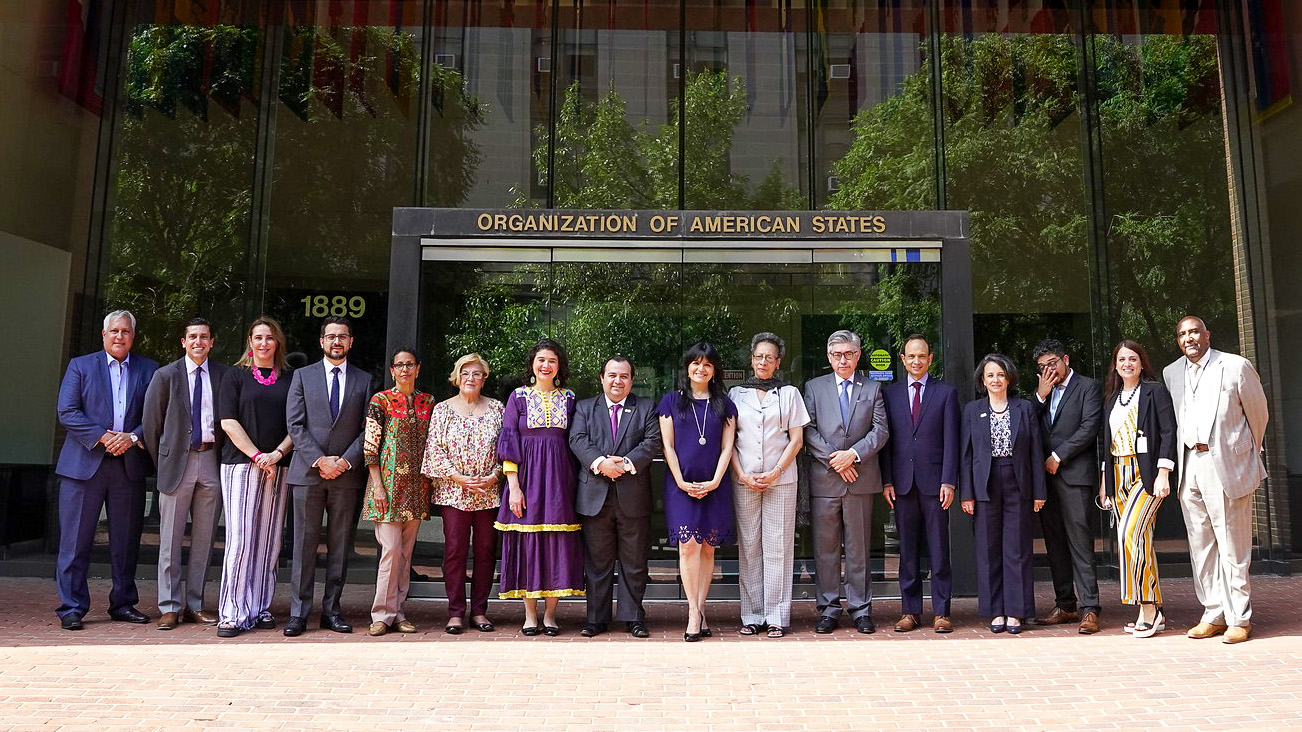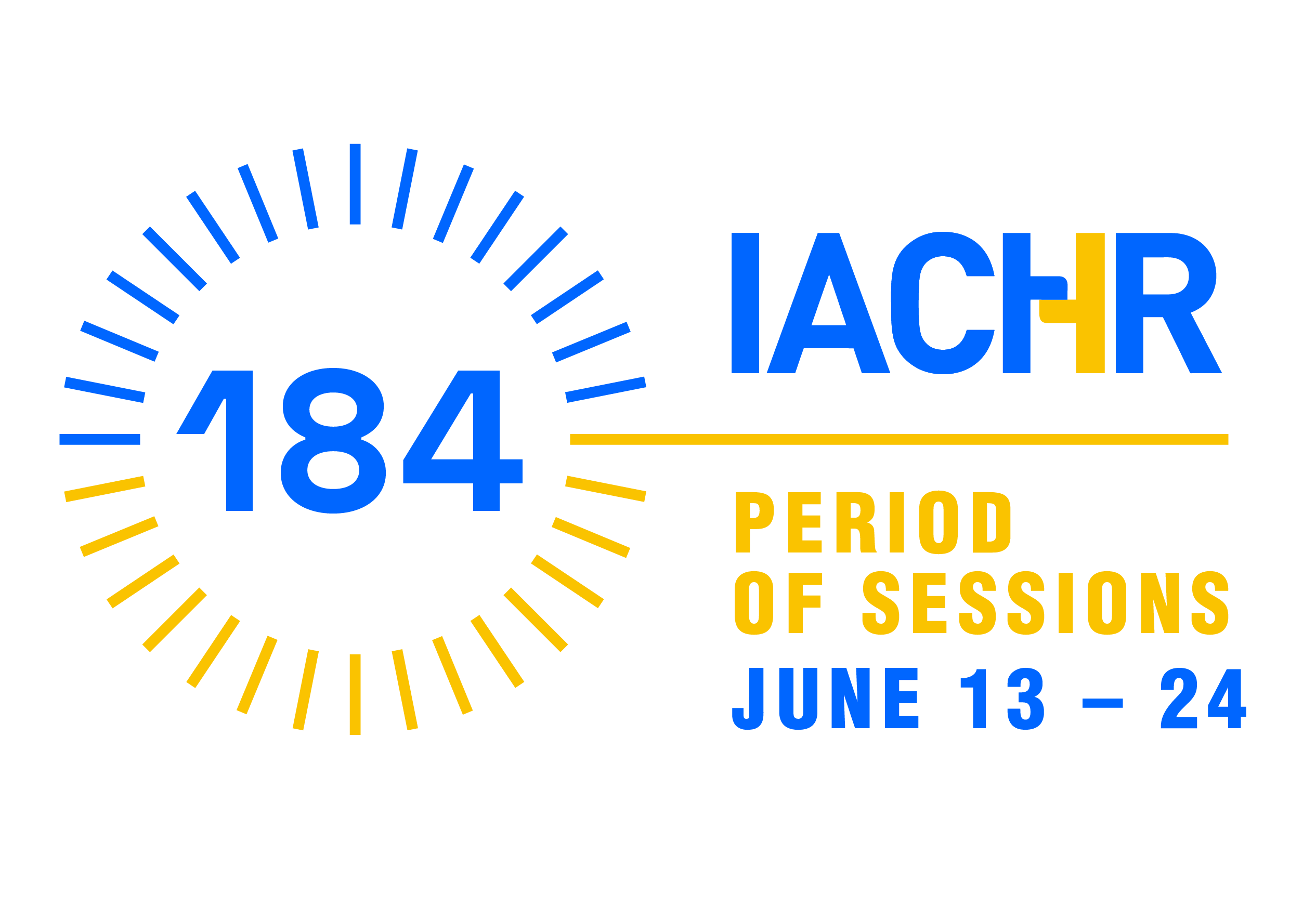
Press Release
IACHR Completes 184th Period of Sessions with 15 Public Hearings on Human Rights in the Americas
June 29, 2022
Contact info
IACHR Press Office
Distribution List
Washington, D.C. – The Inter-American Commission on Human Rights (IACHR) held its 184th Period of Sessions —combining remote and in-person sessions—over the period June 13–24, 2022. A total of 15 public hearings were held on regional human rights issues concerning the Member States of the Organization of American States (OAS) such as, Ecuador, El Salvador, Colombia, Cuba, Guatemala, Nicaragua, Peru, the United States, and Venezuela.
From the 15 hearings, 11 of them addressed regional and country human rights thematic situations, as the issues of neurotechnologies and persons with disabilities, persons who are deprived of liberty, LGBTIQ children, Afro-descendant persons, judicial officers and the rule of law, freedom of expression, gender and access to justice, trade-union and other labor rights, women rights defenders and sexual and reproductive rights. Two additional hearings were carried on about cases, more precisely on the Case 13,572—Mashco Piro, Yora, and Amahuanca Peoples v. Perú, and the Case 13,524—334 Patients at Federico Mora Hospital v. Guatemala. A hearing was also carried out on 10 precautionary measures concerning individuals who are deprived of liberty in Nicaragua and another to follow up on recommendations made by the IACHR on cases and precautionary measures on death penalty in the United States.
Of note was the regional public hearing on women's rights, access to justice and gender stereotypes, which addressed the violations to women’s rights to judicial guarantees and due process based on gender stereotypes. The IACHR stressed that eradicating gender stereotypes requires a sociocultural transformation that starts from education with an inclusive, participatory perspective.
IACHR President Julissa Mantilla Falcón pointed out at the hearing, “This is a historic hearing, with the purpose of reassuring every girl and woman who have struggled to access justice due to gender stereotypes, that they are not alone and not at fault for these violations and also that there are a series of organizations, including the Inter-American Commission, who are working for them.”
Likewise, another hearing was carried on to follow up and promote joint strategies with all the parties (State, petitioners, and beneficiaries) to implement the recommendations made by the IACHR on merits reports and precautionary measures resolutions concerning death penalty and death row in the United States. Its is expected that this hearing aimed at opening a dialogue channel between the parties.
In each of the public hearings, the IACHR received relevant information from the organizations and States in attendance and was able to contribute its own observations, concerns, and calls for protection of and compliance with human rights.
During the 184th Period of Sessions, the IACHR plenary met at the Commission’s headquarters in Washington, D.C., to discuss various issues concerning its mandate. They then met remotely with representatives of more than 40 civil society organizations, to discuss progress concerning the Strategic Plan 2022–2026. During this time the IACHR also discussed on 10 merits reports, approved the report on preventing violence and discrimination against women journalists drafted by its Special Rapporteurship for Freedom of Expression,, and launched talks about a country report on the situation of human rights in Haiti and about thematic reports concerning the COVID-19 pandemic and human rights, and the economic, social, and cultural rights of Afro-descendant persons and indigenous peoples in northern Central America.
Meetings were also held with national human rights institutions in El Salvador, Guatemala, and Honduras; with the Colombian Attorney General's Office; and with experts on the human right to protest in order to exchange views on the challenges posed by this right. In addition, a high-level meeting was held on the human rights situation in Nicaragua to identify possible strategies for attention and advocacy for Nicaraguan society based on the diagnosis of the current situation in the country as described in Chapter IV.B of the 2021 Annual Report.
"The Sessions facilitate a dialogue between States, Civil Society Organizations and victims. In this space, the IACHR receives relevant information on various human rights situations and issues, which serve as inputs for the implementation and comprehensive fulfillment of its mandate. The 184th period of sessions also allowed us to inform and discuss the progress of the Strategic Plan 2022-2025," said Tania Renaum Panszi, Executive Secretary of the IACHR.
The Commission thanks States and civil society organizations for the efforts they made to take part in the 184th Period of Sessions and to contribute to ensuring progress in the defense and promotion of human rights in the Americas. The IACHR notes that, in keeping with Article 63 of its Rules of Procedure, States must take protection measures to ensure the safety of all the people who have taken part in a period of sessions.
Videos of these hearings are available, with subtitles in Spanish and English. This press release is being published alongside an annex with summaries of all the public hearings held during the 184th Period of Sessions.
A principal, autonomous body of the Organization of American States (OAS), the IACHR derives its mandate from the OAS Charter and the American Convention on Human Rights. The Inter-American Commission has a mandate to promote respect for and to defend human rights in the region and acts as a consultative body to the OAS in this area. The Commission is composed of seven independent members who are elected in an individual capacity by the OAS General Assembly and who do not represent their countries of origin or residence.
No. 148/22
11:46 AM



